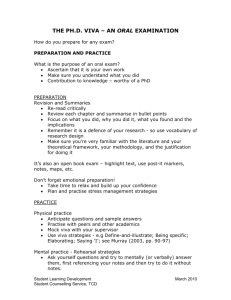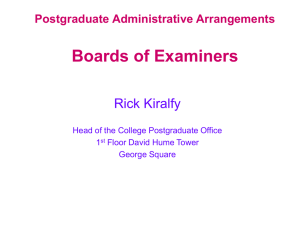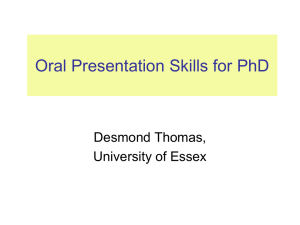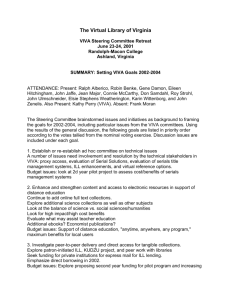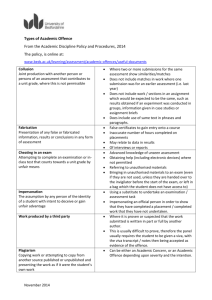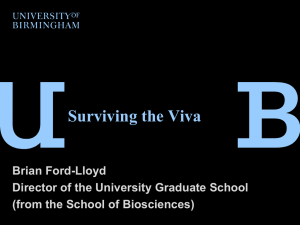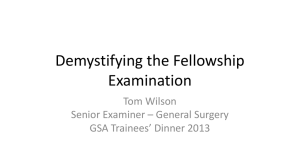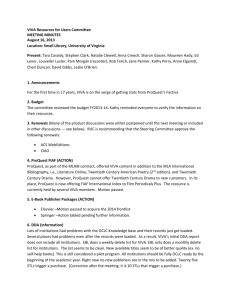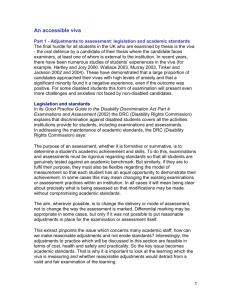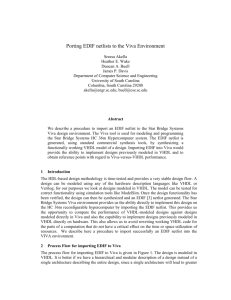MY FRCS JOURNEY Application process For the latest guidance
advertisement
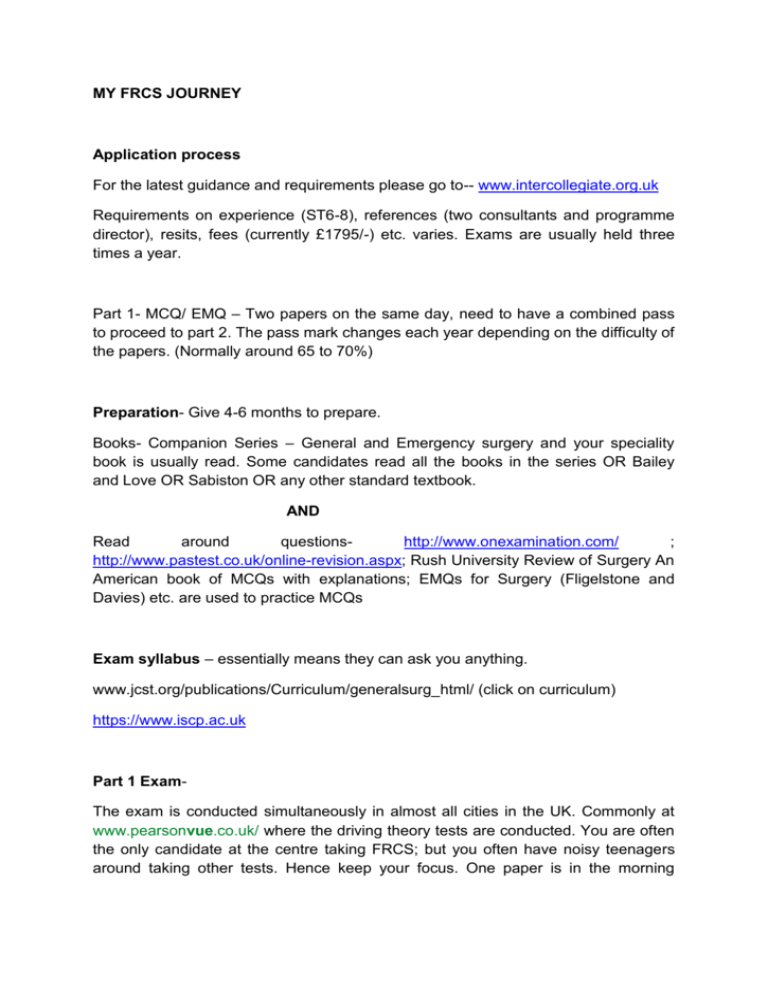
MY FRCS JOURNEY Application process For the latest guidance and requirements please go to-- www.intercollegiate.org.uk Requirements on experience (ST6-8), references (two consultants and programme director), resits, fees (currently £1795/-) etc. varies. Exams are usually held three times a year. Part 1- MCQ/ EMQ – Two papers on the same day, need to have a combined pass to proceed to part 2. The pass mark changes each year depending on the difficulty of the papers. (Normally around 65 to 70%) Preparation- Give 4-6 months to prepare. Books- Companion Series – General and Emergency surgery and your speciality book is usually read. Some candidates read all the books in the series OR Bailey and Love OR Sabiston OR any other standard textbook. AND Read around questionshttp://www.onexamination.com/ ; http://www.pastest.co.uk/online-revision.aspx; Rush University Review of Surgery An American book of MCQs with explanations; EMQs for Surgery (Fligelstone and Davies) etc. are used to practice MCQs Exam syllabus – essentially means they can ask you anything. www.jcst.org/publications/Curriculum/generalsurg_html/ (click on curriculum) https://www.iscp.ac.uk Part 1 ExamThe exam is conducted simultaneously in almost all cities in the UK. Commonly at www.pearsonvue.co.uk/ where the driving theory tests are conducted. You are often the only candidate at the centre taking FRCS; but you often have noisy teenagers around taking other tests. Hence keep your focus. One paper is in the morning (SBA) followed by a lunch break (lunch not provided) followed by EMQ. Results emailed to you in a couple of weeks’ time. Tip: Time is often limited, hence keep up the pace. Practice doing sample papers to get the hang of time. There are no negative marks, so attempt all questions. Give more time to prepare for transplant and other specialities you may be weak in as questions are taken from all specialities. The test is completely on computer with paper provided only for rough work. For sample questions go to www.intercollegiate.org.uk Part 2 Exam- Over two days. The first batch of candidates takes their viva on the first day and clinicals on the morning of the second day. The second batch takes their clinicals in the afternoon of second day and viva on the third day. VIVA The actual viva is held in a local hotel. It is advisable to book your accommodation in the same hotel to reduce commute; but you tend to meet other candidates and examiners who mostly stay there. The exam itself is run very efficiently and is very much like sitting the university/school viva. The actual viva is held in a large function room where 10-12 candidates are examined simultaneously; tends to be quite noisy and you have to really concentrate to hear what the examiners are saying. Each candidate has to take three viva- one academic (20 minutes), one emergency surgery and critical care (30 minutes) and one general and subspecialty (30 minutes). There are two examiners in each table. One examiner questions and the other marks. Candidates are unlikely to be examined by the same examiner more than once. Tip- The stress is on the basics and safe management of the patients rather than latest evidence and papers. Academic viva- Each candidate is given two papers (one general and one your speciality) to read in one hour. Can take notes during the hour and refer to your papers and notes during the viva. Tip: The general paper is often taken from BJS and the speciality breast paper from EJSO. When preparing for the academic viva, practice appraising papers strictly within the time or you may struggle to do it for the exam. Marking of the vivaEach question is separately marked. The marks range from 4 to 8 with 6 being the pass mark for each question. Each examiner will try to ask you three questions in their 15 minutes (6 questions in each table). The examiners are not allowed to discuss each other’s marks and your next table will not know your previous mark. The marking protocol is attached separately. Tip: Since each question and each clinical case is marked separately between 4 and 8, there are plenty of marking points. All these separate marks are added together and you need an average of 6 to pass. So a 5 in one question can be compensated by a 7 in another. You cannot fail on the basis of one question or one table. Keep fighting to the end. ClinicalThe clinical section is held in one of the wards of the local hospital. There are two clinical sessions (general and sub-speciality) with a break between the two. Two examiners take you around different patients and try to cover 6 patients in the 30 minutes. The focus is more on discussion than clinical examination. Scans, pictures, consent taking and breaking bad news can be included. Cases can be very variable from lumps and hernias to complex transplant cases. But the focus is how a general surgeon manages these safely. Preparation for the viva and clinical- Unlike part 1 it is better to focus on scenario based reading and practice rather than reading textbooks. Possible scenarios are included in Jason’s presentation included in this website. Form a local study group of candidates taking the exam. Request consultants to viva you. Go to other clinics to examine cases you are not familiar with. Guidelines – Make sure that you are familiar with the full guidelines of your speciality and go through the summary of other guidelines. For breast trainees- NICE Guidelines on early, advanced and familial breast cancer, ABS guidelines, breast screening guidelines, oncoplastic guidelines. Summary of others like upper GI bleeding, inflammatory bowel disease, colorectal cancer, dyspepsia, pancreatitis etc. Important papers- The stress in the examination is on the basics rather than latest evidence. But trainees need to be able to discuss important papers in their speciality. The important breast papers are mentioned in another presentation in this website and in the companion series breast textbook. Courses Speak to others who have taken the courses before as each course has its advantages and disadvantages. 1. Manchester/ Alpine Course - in January and July. You get 3-4 days of viva practice which is very useful but no clinical cases. www.surgicalcourses.org.uk 2. Going For Gold Held in July. - has practice Clinicals. www.derbyhospitals.nhs.uk/goingforgold.html 3. Liverpool course- January www.liv.ac.uk/surgery/courses/FRCS_Course/index.htm 4. Whipps Cross Coursehttp://www.wxmec.org.uk/courses/HSC.html ConclusionFRCS is an exam which is easy to pass and easy to fail. Start early, make and stick to a revision plan, work hard and steady and don’t forget the breaks. Feel free to contact me for further information. Best wishes Harun Thomas; harunthomas@yahoo.com Education and Training rep, The Mammary fold. October 2013

